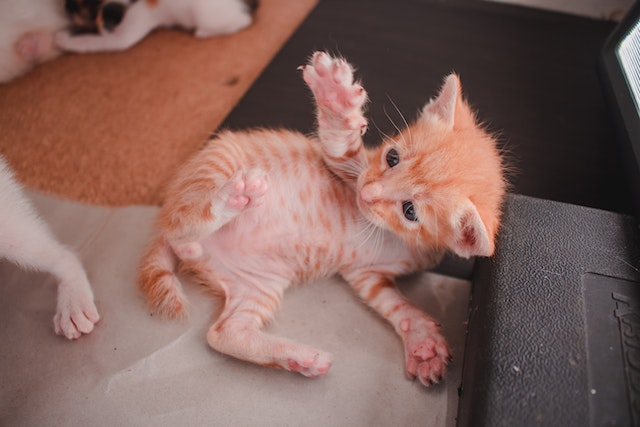
Have you ever caught your furry friend in the act of giving themselves a little manicure? It's one of those moments that can't help but make you chuckle but also concerns you a little bit.
So, what's the deal with cats and their nail-biting habits?
Cats love to bite their nails, mainly for grooming to make sure their nails are trimmed. Biting may also help remove broken pieces of claws, just like hangnails in humans. Biting nails can also help cats keep their paw pads free of trapped particles.
Well, get ready to embark on an adventure with us as we uncover the secrets behind our feline friends' behavior.
In this blog, we will discuss whether it is normal for cats to bite their nails, when one should start to worry about this excessive nail biting, and all the reasons your cat may be biting their nails.
Cat Bite His Nails: Is it Normal?
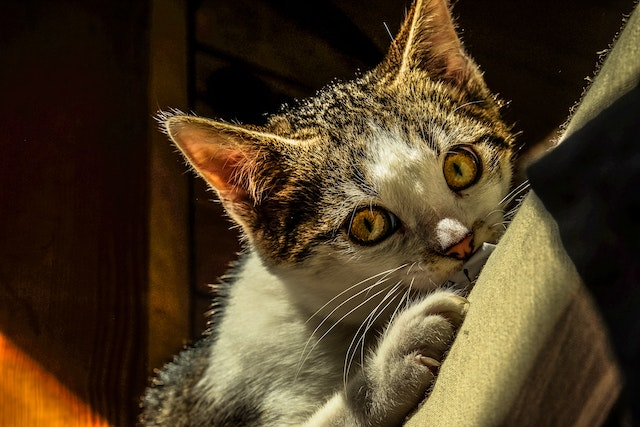
Cats have an exciting way of taking care of their claws. Their claws grow in layers from the inside out, and sometimes the outer layers can crack or wear down.
So, what do cats do? They have their own grooming techniques to deal with this!
You might catch your cat pulling on its nails with its teeth. It may seem strange, but they're trying to remove the old outer layers to reveal a fresh, sharp claw underneath. This is a normal nail-chewing habit. It's like they're giving themselves a mini manicure! This is also a sign of a healthy cat.
Now, don't worry if you see your cat engaging in these behaviors. It's completely and perfectly normal for them to pull and chew their nails during regular grooming sessions. It's just a way for them to keep their claws in tip-top shape.
However, it's essential to pay attention to any changes depending on the different cat breeds. If you notice your cat's abnormal nail chewing or if they do it at unusual times, it could be a sign that something is wrong.
In those cases, it's best to consult a veterinarian who can determine if there's an issue with your cat's claws or any underlying health concerns that need to be addressed.
When Should You Start To Worry?
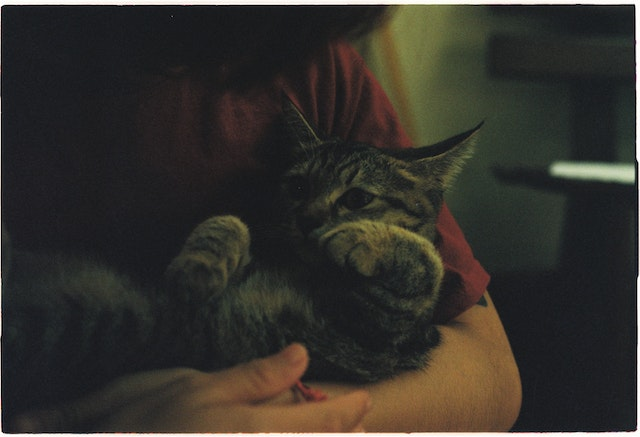
If you notice that your cat is constantly pulling and chewing on their nails, it could be their way of telling you something important. It's a good idea to look closely at their paws and check for any signs of health issues. Look for redness, swelling, hair loss, roughness, cracked, and bleeding skin.
These signs might indicate that something's not right if your cats chew their nails. Redness and swelling could mean inflammation or an allergic reaction.
Hair loss could result from excessive grooming or an underlying skin problem. If you see rough, cracked, or bleeding skin, it could be a sign of dryness, irritation, or possibly an infection or injury.
Suppose you notice these symptoms or are concerned about your cat's paws. In that case, it's a good idea to contact a veterinarian. They can examine your cat, determine what's going on, and provide appropriate treatment.
Let's look into some of the reasons why your cat may be biting their nails excessively.
4 Reasons Why Your Cat Bites Their Nails Excessively
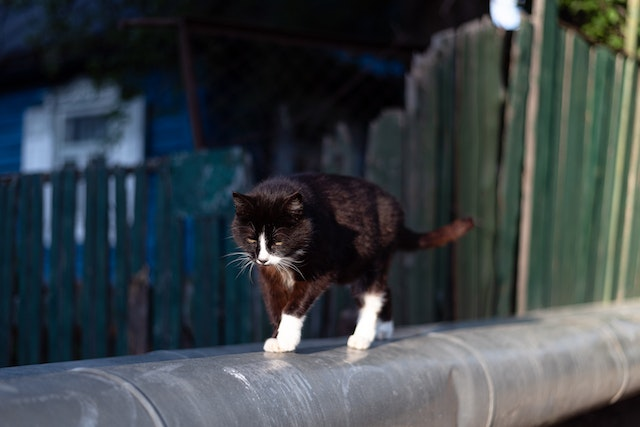
Just like people, cats can face various health issues. Whenever you notice a medical problem, it's best to consult a vet for expert advice. However, having some general knowledge about the possibilities can be helpful.
So, let's embark on a journey to learn why your cat bites their nails excessively.
Reason 1 - Pemphigus
Pemphigus is a skin condition that can affect cats and is caused by an autoimmune response. There are five types of pemphigus, but the most common one in cats is called pemphigus foliaceus.
When a cat has pemphigus, it can lead to irritation in sensitive areas such as the face (including eyelids, nostrils, and ears) and the genital region. Interestingly, the paws can also be affected.
The condition can cause lesions to develop on the beds of the toenails, creating painful and crusty areas. As a result, the cat may try to alleviate the discomfort by licking or grooming their paws excessively, focusing on their claws.
Reason 2 - Ringworm
Feline dermatophytosis, or ringworm, is a common skin condition in cats. It is a fungal infection that cats can pick up from the soil. Normally, cats can get rid of the fungi through their regular grooming routine.
However, when the fungus becomes established, it can affect the hair and nails, as they contain a substance called keratin that the fungus feeds on.
Additionally, the skin can become infected and inflamed. If left untreated, ringworm can cause symptoms such as hair loss, scaly skin, and infected claws and nails. These symptoms may lead to excessive grooming as the cat tries to alleviate the discomfort caused by the infection.
Reason 3 - Infections
Cats can experience bacterial or yeast infections that specifically target their paws. These infections can occur unexpectedly, leaving you wondering why your cat is biting their nails.
Additionally, cats can react adversely to chemicals or detergents used on household surfaces, contributing to paw discomfort and excessive grooming.
Reason 4 - Old Age
When cats reach their golden years, they often need extra care and attention. This can include more grooming sessions and a special diet tailored for senior cats. As cats age, hormonal imbalances can occur, causing their nails to become too thick or too brittle. Additionally, older cats can be prone to various illnesses, including cancerous growths and tumors.
As your cat gets older, you might start wondering why they're biting their nails. In any case, it's always a good idea to consult a veterinarian.
They can provide the best advice and guidance for your cat's needs. Many issues can be effectively managed, especially when identified and addressed early on. So, don't hesitate to seek professional help to ensure your elderly kitty gets the proper care and treatment they deserve.
Non-Medical Reasons
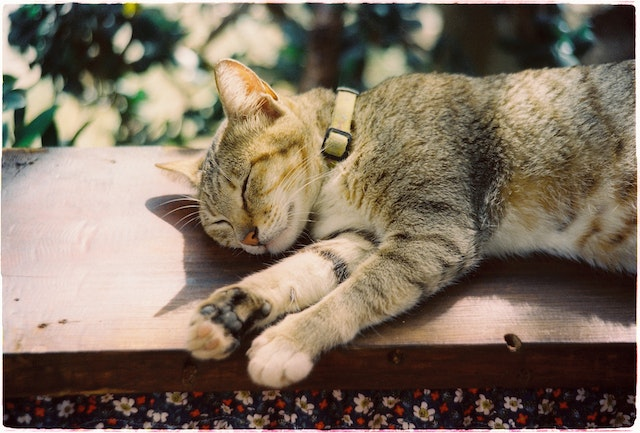
Here are some non-medical reasons that you can look out for:
-
Boredom
Cats who feel bored or have excess energy might resort to nail-biting to cope. To address this, providing them with stimulating cat toys in regular playtime sessions is essential.
These measures can help alleviate boredom and provide outlets for their energy, reducing the likelihood of the cat's nail chewing and biting behavior.
-
Stress or anxiety
Cats can exhibit stress or anxiety through various behaviors, including nail biting. Changes in their environment, such as moving to a new home or introducing new pets, can trigger this behavior.
Creating a calm and secure environment while using techniques like pheromone sprays or calming supplements may help reduce stress.
-
Attention-seeking
Some cats may bite their nails to get attention from their owners. If they have learned that nail biting receives a response, they may continue the behavior to seek attention.
What Can You Do If Your Cat Continues With Excessive Nail Biting?
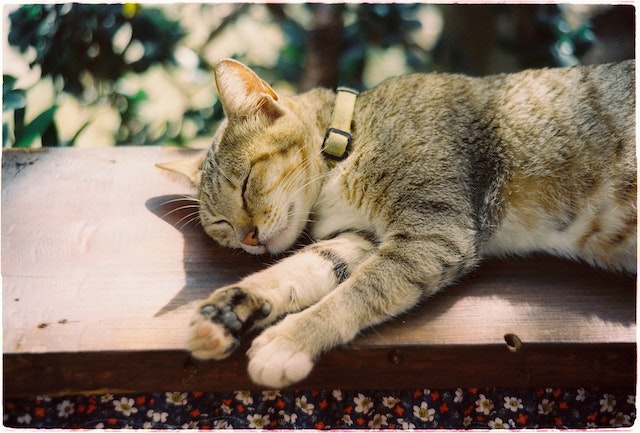
Suppose your cat is engaging in excessive nail biting. In that case, there are several steps you can take to address this behavior and promote their well-being.
1) Regular grooming
Ensure that your cat's nails are trimmed to an appropriate length. This can help prevent the nails from becoming sharp or overgrown, reducing the need for excessive biting.
In case if your cat's nails are splitting, make sure you know how to treat a split cat nail. If you don't, it's best to seek professional help.
2) Provide appropriate scratching outlets
Cats have a natural instinct to scratch. This instinct helps keep paw pads and nails healthy. Provide scratching posts or boards in various locations around your home to give them a suitable outlet for their scratching behavior.
3) Environmental enrichment
Keep your cat engaged in interactive play sessions using cat toys, encouraging them to chase, pounce, and play. This can help alleviate boredom and excess energy, reducing the urge to bite their nails.
4) Maintain a routine
Creating and maintaining a routine for your indoor cat may sound unconventional. Still, it can benefit them, just like it can benefit you.
Establishing a consistent schedule for feeding, playtime, and regular grooming can bring stability and predictability to their daily lives. Try to feed your cat at the same time every day, engage in play sessions at specific times and durations, and, if possible, schedule a short grooming session every day.
Sticking to this routine gives your cat a sense of structure and helps them feel more secure and content.
5) Stress reduction
Figure out any potential sources of stress that you see in your cat's environment. Create a calm and secure space for them, and consider using pheromone sprays or diffusers to help reduce stress and anxiety.
6) Seek veterinary help
If the excessive nail biting continues despite your efforts, consult a veterinarian. They can examine your cat, rule out any underlying medical conditions, and provide additional guidance or treatment options.
Patience and consistency are key, and working closely with your veterinarian can help ensure the well-being of your furry friend.
Final Words!
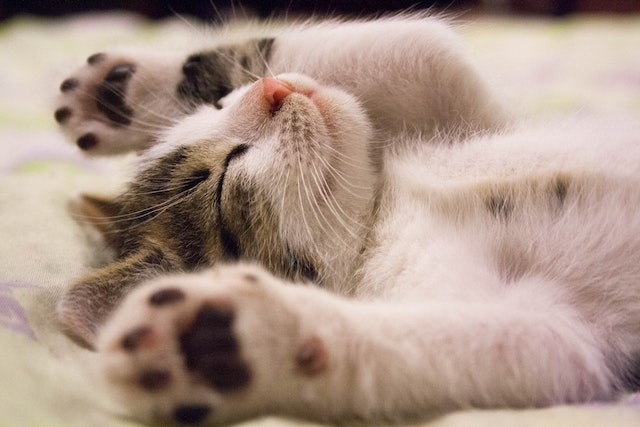
We hope this article answered your question, "Why does my cat bite his nails?"
To sum up, cats biting their nails can happen for various medical and non-medical reasons. While some nail biting is normal, excessive or persistent biting might signal a problem that needs attention. Keep an eye out for any signs of discomfort, and don't hesitate to contact a vet if needed.
Non-medical reasons could be boredom, stress, or just a quirky habit. To tackle this, entertain your cat with fun toys, playtime, and scratching posts. Sticking to a regular routine for feeding, play, and grooming can bring a sense of stability to their lives and reduce nail-biting behavior too.
Stay attentive to your furry friend's needs, and with the help of your vet, you can ensure they have a happy and nail-biting-free life.
Frequently Asked Questions (FAQs)
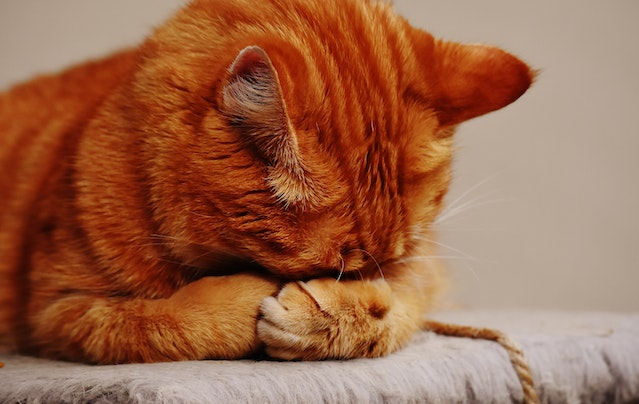
Should I be concerned if my cat bites their nails occasionally?
Occasional nail biting is usually normal. However, if it becomes excessive, causes discomfort, or is accompanied by other concerning symptoms, it's best to seek veterinary advice.
Can nail caps or covers be used to prevent nail biting in cats?
Nail caps or covers are not typically used to prevent nail-biting behavior in cats. These are more commonly used to protect furniture or surfaces from scratching. However, they may be a practical solution since they create a barrier between the nails and your cat's mouth.
Are there any natural remedies or supplements that can help reduce nail biting in cats?
Some natural remedies or supplements, such as pheromone diffusers or herbal calming remedies, may help reduce stress and anxiety in your feline friends, which can be contributing factors to nail biting.
However, it's essential to consult a veterinarian before using such products to ensure they are safe and appropriate for your cat.


0 comments